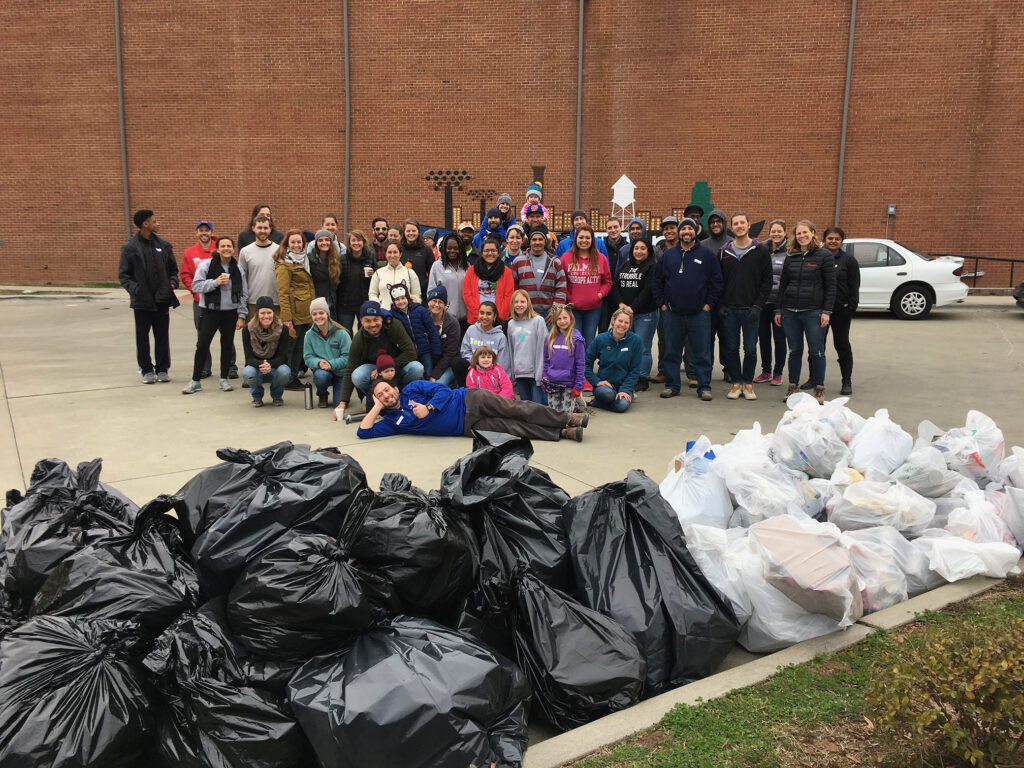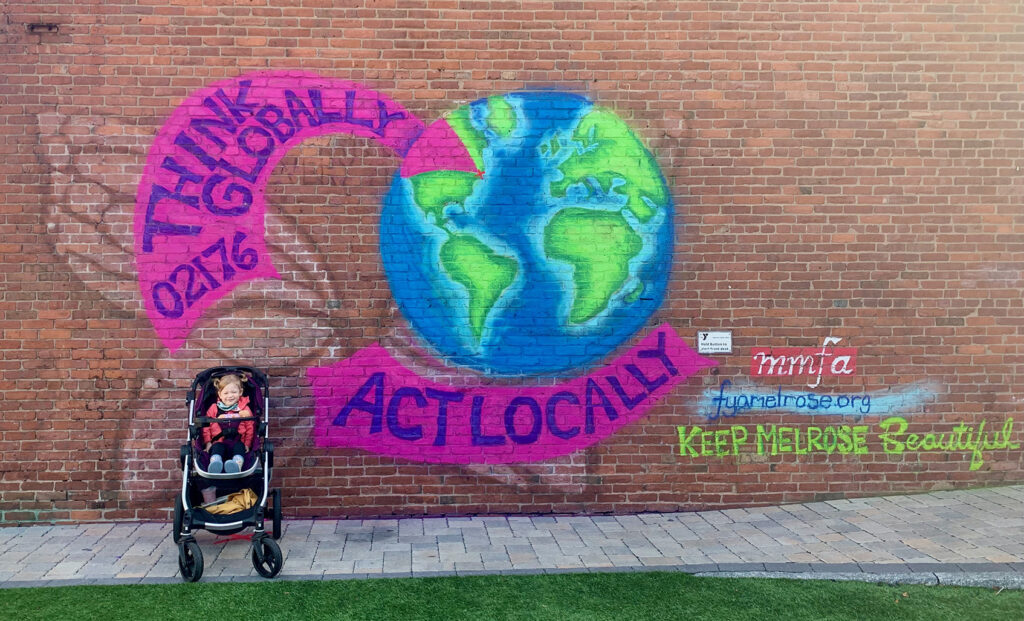Dear Readers, Am I Doing Enough?
A letter from a researcher “from away” grappling with questions around meaningful environmental action
By Erin Victor
Dear Readers,
First and foremost, thank you. I am imagining you curled up with a nice hot cup of coffee or tea as you take the time to leisurely read this issue of Spire: The Maine Journal of Conservation and Sustainability. I am glad you are here and part of this ongoing dialogue around collectively (re)imagining what effective environmental action looks like here in Maine, the Pine Tree State, Vacationland.
I need to start with an important disclaimer. I am “from away.” I was born in Livonia, Michigan.1 I am a proud Michiganian/Michigander2, and my parents, brother, grandparents, and most of my aunts, uncles, and cousins still live within 20 miles of each other outside of Ann Arbor.
However, I come to Maine by way of Massachusetts. My husband, two-year-old daughter, and my thirteen-year-old dog moved up to Maine in June 2021. We bought an old Victorian home in the tree streets of Bangor, ME, from the loveliest couple who lived there for 45 years. I was eight months pregnant when we moved, working full-time as an Environmental Analyst for the Commonwealth of Massachusetts. I was about to start my first semester as a doctoral student at the University of Maine.
Why am I telling you all of this? Because I want to talk about community.
Although I am proud of my Michigan roots, I am constantly struggling with defining my community and what this means for my responsibility and obligations as a research-activist studying complex global environmental problems3 at the University of Maine.
I have moved a lot — for school, for my husband’s school, for work, and for my husband’s work. Each time I find myself uprooted, needing to rebuild some sense of community and ground myself in a place, with the people who live there. The constant coming and going is exhausting.
That said, I am so thankful for the opportunity to pursue a doctoral degree at the University of Maine. I have fallen in love with Maine.
During the first semester of my doctoral program, I heard numerous classmates and colleagues expressing their desire to do something. We all seemed to be itching to do more than reading and writing academic papers. We wanted to take meaningful action. But what does meaningful action actually mean?4 What does it look like in practice?
 The author pictured with a group of volunteers and community organizers after a large litter cleanup in Durham, NC. The black bags in front of the volunteers are trash, and the white bags are all recyclables. Photo Credit: Tania Dautlick, Executive Director of Keep Durham Beautiful.
The author pictured with a group of volunteers and community organizers after a large litter cleanup in Durham, NC. The black bags in front of the volunteers are trash, and the white bags are all recyclables. Photo Credit: Tania Dautlick, Executive Director of Keep Durham Beautiful.
I have dedicated myself personally and professionally to environmental sustainability. I have organized volunteer tree plantings and litter cleanups; I wash my baby’s cloth diapers with eco-friendly laundry detergent sheets made in the U.S.; I led a statewide stakeholder group to develop a Reduce and Reuse Action Plan for the Commonwealth of Massachusetts. But am I doing enough? Am I making a difference?
I have heard of people experiencing climate anxiety, but it was not until this past October that I experienced this personally. On the eve of the last day of the international climate negotiations (COP26) in Glasgow, I found myself tossing and turning in bed. I knew that my infant would wake me up in a few hours to eat, and I needed to get some sleep. But I could not sleep. I oscillated between rage, tears, and a deep sense of loss. What world are my children inheriting? COP26 was framed as our “last hope” for meeting the 1.5 °C warming goal. And what happens if we fail? What hope do we have if the people representing me in these international climate negotiations advocate for voluntary pledges, technological fixes, and solutions that further commodify the environment?
I resonated with what the British writer-activist George Monbiot tweeted after COP26: “There is a point beyond which our grief about the gathering collapse of Earth systems can no longer be suppressed. I now realize that I’ve protected myself all these years by intellectualizing the problem. But as governments keep failing, I can’t keep stifling the sense of loss.”
I had also intellectualized the problem.
I share this not to depress you but to offer an opening for a larger conversation about how we individually and collectively grapple with making a meaningful difference when facing large, overwhelming, complex problems that we see playing out on a global scale.
I find myself coming back to community. To the need to collaborate locally. Like the adage goes “think globally, act locally.”
 The author’s eldest child in front of a sign painted by volunteers of the organization Keep Melrose Beautiful as part of the city’s Earth Day celebration. The author was an active member of this group while she lived in Melrose, MA. Photo Credit: Erin Victor.
The author’s eldest child in front of a sign painted by volunteers of the organization Keep Melrose Beautiful as part of the city’s Earth Day celebration. The author was an active member of this group while she lived in Melrose, MA. Photo Credit: Erin Victor.
As I try to put down roots in Bangor and at the University of Maine, I continue to grapple with these questions around responsibility, obligation, and accountability. And to whom? I do not have all the answers. I do know that I can start by recognizing that I am living and studying in the homeland of the Penobscot Nation. Homeland where, as The University of Maine Land Acknowledgement reminds us, issues of water and territorial rights and encroachment upon sacred sites are ongoing.
I have raised more questions than I have answers for. But I want to leave you with two things:
First, I want to share two examples of how I have been individually and collectively grappling with this desire to do something meaningful (see below).
Second, I’d like to extend an invitation. If you took the time to read this letter and it resonated with you, consider this an open invitation to join what my fellow colleagues and myself are tentatively calling “The Empathy Lab” or “The Empathy Collective.” Simply send me an email — erin.victor@maine.edu — if you would like to join this support system where we are navigating these tensions around research and action together; as we continue to grapple with questions around what is meaningful environmental action?
Respectfully,
Erin Victor
Doctoral Student, Anthropology and Environmental Policy
The University of Maine (Orono, ME)
Resident of Bangor, ME
Example 1. A collaborative letter written to national representatives participating in the international climate negotiations
The following letter was written collectively by Paloma Henriques, Saif Sadeq, Jared Entwistle, and myself. We are graduate students at the University of Maine and took Dr. Cindy Isenhour’s Human Dimensions of Climate Change class in Fall 2021. We shared this letter as a google document within our respective departments at the University, emailed it and tweeted it to the U.S. Delegates at COP26, and shared the letter among our social networks. Seventy-five students, faculty, and staff from the University of Maine, other academic universities, and concerned citizens signed this letter in less than a week. You can find the “living” version with all the signatures here.
An Open Letter to the U.S. Delegates at COP 26
The Sixth IPCC Assessment Report (AR6) released earlier this fall does not paint a very hopeful picture for our collective efforts to mitigate global warming. COP26 has been framed as our “last hope” for meeting the 1.5 °C warming goal. And what happens if we fail? Despite the commitments made by leaders across the world at COP21 in Paris, we have yet to reach peak greenhouse gas emissions.
Regardless of the influence on the actual content of the report, the leaked documents received by IPCC from nations asking scientists to downplay certain aspects of climate change in the assessment report prior to COP26 highlight the powerful industry interests that threaten to stymie progress towards climate reduction goals. The conflict of interest is clear – shareholder earnings today are more important than human lives and the future of our planet.
Billions of people are vulnerable to climate events across the globe. Even if we do meet the 1.5 °C warming goal, wildfires will continue to devastate entire communities, homes and businesses will be flooded, crops will be lost to drought and diseases. We are not just talking about the livelihoods of future generations yet to be born. We are talking about the precarity of our lives — your lives — here and now.
If the COVID-19 pandemic has taught us anything, it is that the future is uncertain. As much as we’d like to believe we have control over ‘nature,’ the daily news serves as a reminder that this is not the case. Major storm events, new record temperatures, sea levels rising, smog, emergent infectious diseases have become the ‘new norm.’ However, this is not to imply that we are all doomed. There is one thing you have control over — you can stand up for the basic human rights for all — today and tomorrow. Do not let corporate greed determine our future. Maybe the billionaires will succeed in colonizing Mars, but where does that leave the rest of us?
As you head into the COP26 negotiations, we ask that you keep these three questions front of mind:
Who is missing from the table? COVID-19 radically disrupted our lives, seemingly overnight and on a global scale. Yet, the impacts were not felt equally across the globe. We urge you to look around the room and see who is missing from the table. There are people who would like to be here today but cannot due to unequal global distribution of the COVID-19 vaccine. How can you ensure that their voices and concerns are still heard at COP26?
What are the underlying assumptions in our climate models? All current Shared Socio-Economic Pathways are predicated on economic growth. What if we include a different model – one based on different indicators of progress and well-being?
Who are you here to protect? Private industry interests? Or human lives and livelihoods?
We commend each and every one of you who have invested considerable time, money, energy and creativity into addressing this global “wicked problem.” We urge you to move beyond the “politics of cause and blame” that have dominated past conferences and instead use this time to collectively re-imagine and negotiate what it means to be human in a constantly changing world.This letter reflects our individual expertise and opinions and does not speak on behalf of the University of Maine or any other institution.
Example 2. Bangor Daily News Opinion Piece
In February 2022, I contributed an opinion piece to the Bangor Daily News as a member of the Maine chapter of the national Scholar Strategy Network (SSN). SSN brings together scholars across the country to address public challenges and their policy implications. The piece was entitled: “The case for a different kind of climate action” and starts with a story of my two-year-old claiming a raindrop. You can support local news by reading it online here.
Note: although the byline only includes my name, this is deceptive. Numerous friends, colleagues, and family members helped edit this piece. Thank you (you know who you are) for all your help cutting out the jargon, suggestions for making the writing more impactful, and helping me cut it down to 600 words.
Notes
1 Yes, I would be pointing to my palm to explain where that is located if we were together in person.
2 I have used both Michiganian and Michigander. My father informed me last summer that this debate was taken up by Michigan legislature in 2017 where they decided that “Michigander” is the official name for Michigan residents. This legislation was passed when I was living in North Carolina. I still find myself saying that I am a Michiganian. I appreciate that this Michigan Radio piece from January 2020 suggests this matter remains unsettled despite the state law.
3 My dissertation research explores policy solutions to the “plastic crisis” where I specifically focus on Extended Producer Responsibility (EPR) programs for packaging in Canada and the United States.
4 Thank you to the anonymous reviewer who came up with this excellent play on words!

